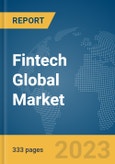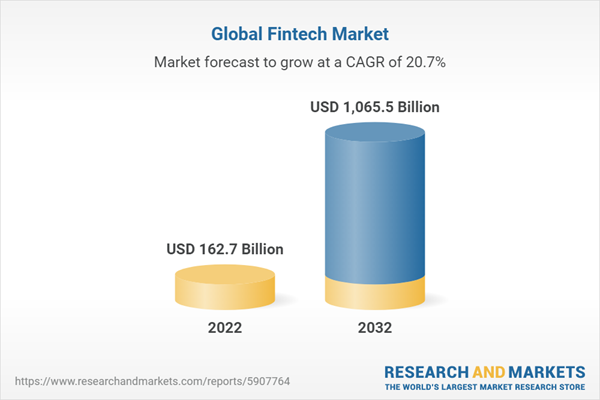The global fintech market reached a value of nearly $162.7 billion in 2022, having increased at a compound annual growth rate (CAGR) of 11.1% since 2017. The market is expected to grow from $162.7 billion in 2022 to $388.1 billion in 2027 at a rate of 19.0%. The market is then expected to grow at a CAGR of 22.4% from 2027 and reach $1,065.5 billion in 2032.
Growth in the historic period resulted from strong economic growth in emerging markets, the rise in globalization and cross-border payments, increased internet penetration, the rise in the penetration of smartphones and the rise in disposable income. Factors that negatively affected growth in the historic period were the rise in cyber security concerns and the lack of consumer education and awareness on fintech.
Going forward, the rising penetration of e-commerce, government support, the rising penetration of blockchain technology and the rising urbanization will drive the market. Factors that could hinder the growth of the fintech market in the future include regulatory challenges and geopolitical tensions.
The fintech market is segmented by type of service into payments, insurance, fund transfer, wealth management, personal finance, personal loans and other types of service. The insurance market was the largest segment of the fintech market by type of service, accounting for $75.1 billion or 46.2% of the total market in 2022. The fund transfer market is expected to be the fastest-growing segment going forward at a CAGR of 31.3%.
The fintech market is segmented by service provider into payment processors, securities brokerages and investment firms, banks, non-banking financial companies and other service providers. The payment processors market was the largest segment of the fintech market by service provider, accounting for $70.1 billion or 43.1% of the total market in 2022. It is expected to be the fastest-growing segment going forward at a CAGR of 20.0%.
The fintech market is segmented by technology into mobile commerce and transfers, robotic process automation, data analytics and other technologies. The other technologies market was the largest segment of the fintech market by technology, accounting for $92.8 billion or 57.0% of the total market in 2022. The robotic process automation market is expected to be the fastest-growing segment going forward at a CAGR of 30.0%.
North America was the largest region in the fintech market, accounting for 37.1% of the global market in 2022. It was followed by Asia Pacific, Western Europe and the other regions. Going forward, the fastest growing regions in the fintech market will be Africa and the Middle East, where growth will be at CAGRs of 32.4% and 27.2% respectively from 2022-2027.
The global fintech market is highly concentrated, with a large number of players operating in the market. The top ten competitors in the market made up to 54.39% of the total market in 2022. PayPal Holdings Inc was the largest competitor with 14.38% share of the market, followed by Block Inc with 9.05%, Stripe Inc with 7.32%, Tencent Holdings Ltd. with 7.21%, Adyen N.V. with 5.28%, Ant Group with 4.49%, Nubank with 2.50%, ZhongAn Online P&C Insurance Co. Ltd. with 1.98%, Microsoft Corporation with 1.22% and IBM Corporation with 0.96%.
The top opportunities in the fintech market by type of service will arise in the insurance market, which will gain $74.8 billion of global annual sales by 2027. The top opportunities in the fintech market by service provider will arise in payment processors market, which will gain $104.3 billion of global annual sales by 2027. The top opportunities in the fintech market by technology will arise in other technologies market, which will gain $102.0 billion of global annual sales by 2027. The fintech market size will gain the most in China at $76.8 billion.
Market-trend-based strategies for the fintech market include launch of advanced tech labs, increasing use of mobile payment technology, implementation of blockchain technology, smart contracts, focus on innovation platforms, focus on artificial intelligence, increasing investments, embedded fintech and strategic partnerships and collaborations.
Player-adopted strategies in the fintech industry includes expanding business through acquisitions, increasing mergers and acquisitions to expand geographical reach, focuses on strategic partnerships and collaborations to expand geographic reach and focusing on product innovations.
To take advantage of the opportunities, the recommends the fintech companies to focus on innovation platforms, focus on artificial intelligence, focus on blockchain technology, expand in emerging markets, continue to focus on developed markets, focus on strategic partnerships and collaborations, provide competitively priced offerings, participate in trade shows and events, continue to use B2B promotions focus on small and medium-sized enterprises (SMEs), continue to target financial institutions, and focus on investors and traders.
Table of Contents
Executive Summary
Fintech Global Market Opportunities And Strategies To 2032 provides the strategists; marketers and senior management with the critical information they need to assess the global fintech market as it emerges from the COVID-19 shut down.Reasons to purchase
- gain a truly global perspective with the most comprehensive report available on this market covering 12 geographies.
- understand how the market is being affected by the coronavirus and how it is likely to emerge and grow as the impact of the virus abates.
- create regional and country strategies on the basis of local data and analysis.
- identify growth segments for investment.
- outperform competitors using forecast data and the drivers and trends shaping the market.
- understand customers based on the latest market research findings.
- benchmark performance against key competitors.
- utilize the relationships between key data sets for superior strategizing.
- suitable for supporting your internal and external presentations with reliable high-quality data and analysis
Description:
Where is the largest and fastest growing market for fintech? How does the market relate to the overall economy, demography and other similar markets? What forces will shape the market going forward? This report answers all these questions and many more.report covers market characteristics; size and growth; segmentation; regional and country breakdowns; competitive landscape; market shares; trends and strategies for this market. It traces the market’s historic and forecast market growth by geography. It places the market within the context of the wider fintech market; and compares it with other markets.
The report covers the following chapters.
- Introduction And Market Characteristics: Brief introduction to the segmentations covered in the market, definitions and explanations about the fintech market.
- Key Trends: Highlights the major trends shaping the global fintech market. This section also highlights likely future developments in the market.
- Macro-Economic Scenario: The report provides an analysis of the Russia-Ukraine war, impact of the COVID-19 pandemic and impact of rising inflation on global and regional markets, providing strategic insights for businesses in the fintech market.
- Global Market Size And Growth: Global historic (2017-2022) and forecast (2022-2027, 2032F) market values, and drivers and restraints that support and control the growth of the market in the historic and forecast periods.
- Regional And Country Analysis : Historic (2017-2022) and forecast (2022-2027, 2032F) market values and growth and market share comparison by region and country.
- Market Segmentation: Contains the market values (2017-2022) (2022-2027, 2032F) and analysis for each segment by type of service, by service provider and by technology in the market.
- Regional Market Size And Growth: Regional market size (2022), historic (2017-2022) and forecast (2022-2027, 2032F) market values, and growth and market share comparison of countries within the region. This report includes information on all the regions Asia-Pacific, Western Europe, Eastern Europe, North America, South America, Middle East and Africa and major countries within each region.
- Competitive Landscape: Details on the competitive landscape of the market, estimated market shares and company profiles of the leading players.
- Key Mergers And Acquisitions: Information on recent mergers and acquisitions in the market covered in the report. This section gives key financial details of mergers and acquisitions, which have shaped the market in recent years.
- Market Opportunities And Strategies: Describes market opportunities and strategies based on findings of the research, with information on growth opportunities across countries, segments and strategies to be followed in those markets.
- Conclusions And Recommendations: This section includes recommendations for fintech providers in terms of product/service offerings geographic expansion, marketing strategies and target groups.
- Appendix: This section includes details on the NAICS codes covered, abbreviations and currencies codes used in this report.
Scope
Markets Covered:
- 1) By Type Of Service: Payments; Insurance; Fund Transfer; Wealth Management; Personal Finance; Personal Loans; Other Types Of Service
- 2) By Deployment: Payment Processors; Securities Brokerages; Investment Firms; Banks; Non-Banking Financial Companies; Other Service Providers
- 3) By Technology: Mobile Commerce And Transfers; Robotic Process Automation; Data Analytics; Other Technologies
Companies mentioned:
PayPal Holdings Inc; Block Inc; Stripe Inc; Tencent Holdings Ltd; Adyen N.V; Ant Group.Countries:
China; Australia; India; Indonesia; Japan; South Korea; USA; Brazil; France; Germany; UK; RussiaRegions:
Asia-Pacific; Western Europe; Eastern Europe; North America; South America; Middle East; AfricaTime series:
five years historic and ten years forecast.Data:
ratios of market size and growth to related markets; GDP proportions; expenditure per capita; fintech indicators comparison.Data segmentations:
country and regional historic and forecast data; market share of competitors; market segments.Sourcing and referencing:
data and analysis throughout the report is sourced using end notes.Companies Mentioned
- PayPal Holdings Inc
- Block Inc
- Stripe Inc
- Tencent Holdings Ltd
- Adyen N.V
- Ant Group
- Ant Group
- Nubank
- ZhongAn Online P&C Insurance Co. Ltd.
- Microsoft Corporation
- IBM Corporation
- Mswipe
- DigitalX
- Power Ledger
- Data61
- ANZ
- Westpac
- Lapits
- Indra Capital
- L&T Infotech
- Hyperlink InfoSystem
- Moontek
- EvaCodes
- Infograins
- Trust Alliance Information Development Inc. Ltd.
- Chimpare
- SoluLab
- Avaloq
- Zaman
- Adhara,
- Everledger
- Travala.com
- Coinfirm
- Unicsoft
- Aspired
- Labrys
- NaNLABS
- Amaris
- Say Digital I/O
- Double Data
- LifePay
- QIWI
- PayURomania
- CreamFinanace
- KredytMarket
- Twisto
- Visa
- Upgrade
- Paypal
- Upstart
- Ally Financial
- Kabbage
- Avant Inc
- SoFi Inc
- Square
- Stripe
- Ripple
- Coinbase
- Robinhood
- Chime
- Plaid
- Afluenta
- Alegra
- Facturedo
- Geru
- Moni
- PagoFlash
- Seguro Simple
- StoneCo
- C6 Bank
- QuintoAndar
- Mercado Bitcoin
- EBANX
- Paytabs
- Bayzat
- Aqeed
- Colu
- Souqalmal
- Beehive Fintech
- Telr
- Valify Solutions
- Delter IT
- Agel
- Credequity
- Moneta Technologies
- BlueMoney Business Wallet
- Branch
- Tala
- Cellulant
- Jumo
- Paga
- OneFi
Table Information
| Report Attribute | Details |
|---|---|
| No. of Pages | 333 |
| Published | November 2023 |
| Forecast Period | 2022 - 2032 |
| Estimated Market Value ( USD | $ 162.7 Billion |
| Forecasted Market Value ( USD | $ 1065.5 Billion |
| Compound Annual Growth Rate | 20.7% |
| Regions Covered | Global |
| No. of Companies Mentioned | 92 |









